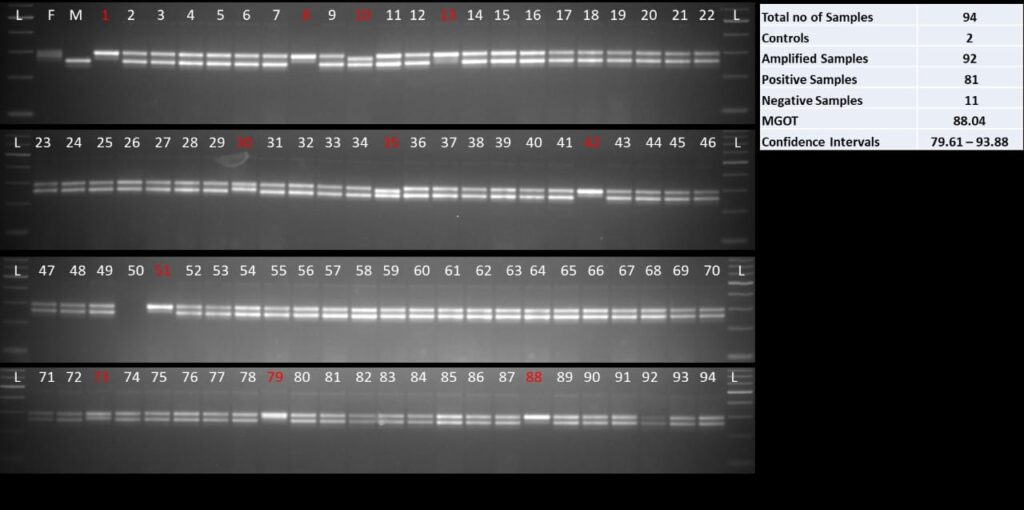The Impact of Microsatellite Markers in Genetic Purity Analysis
In the complex world of agriculture, preserving the genetic purity of crops plays a crucial role in shaping their productivity and quality. As we explore the domain of seed production, especially when dealing with hybrid plants, ensuring the reliability of genetic traits becomes extremely important. This not only ensures the best possible harvest but also makes sure that the crops remain uniform and stable in their characteristics.

Genetic Purity Analysis in Production and Foundation Lots (Hybrids)
The spectre of genetic contamination looms large, posing a potential threat to crop varieties. The inadvertent introduction of foreign genetic material during seed transfer across generations can lead to the degradation of unique traits. Detecting and rectifying such contamination is crucial to ensure the resilience and reliability of crop varieties.
In the pursuit of sustainable agriculture, maintaining genetic purity across seed generations assumes a central role, unlocking the full potential of hybrids and serving as a bulwark against unintended genetic alterations that could undermine crop quality.
Maintaining Genetic Purity at Each Seed Generation
Traditionally, the grow-out test (GOT) has been the stalwart method for purity assessment. However, its labor-intensive, time-consuming nature, and resource demands make it less tenable in today’s dynamic agricultural landscape.
To surmount the shortcomings of traditional methods, the agricultural community is turning to advanced DNA marker systems. Microsatellite markers, specifically Simple Sequence Repeats (SSR), are emerging as a beacon of hope for efficient, accurate, and rapid genetic purity analysis.
Microsatellites, or SSR markers, stand out as co-dominant and multi-allelic entities. Their precision and ability to reveal multiple alleles make them invaluable for dissecting genetic intricacies with finesse.
Advantages of SSR Markers in Plant Genetics and Breeding
Compared to other DNA markers like RAPD, RFLP, ISSR, and AFLP, SSR markers offer distinct advantages. Their co-dominant nature, wide genome coverage, and ease of detection through Polymerase Chain Reaction (PCR) contribute to their efficacy in genetic purity analysis. SSR markers’ ability to provide detailed genetic information sets them apart. The co-dominant nature of SSRs affords a nuanced understanding of genetic variations, contributing to the reliability of purity assessments.
Numerous studies attest to the efficacy of SSR markers in genetic purity analysis. Their successful application in identifying hybrids underscores their potential to revolutionise seed production practices across various crops.
Methodology of PCR-Based DNA Marker System
Initiating the journey towards genetic purity analysis involves extracting DNA from seed samples. This step ensures a pristine genetic material for subsequent analysis. Tailoring the approach, 15 specific microsatellite markers are employed for each crop. This targeted methodology enhances the accuracy and reliability of genetic purity assessment. The cornerstone of the process is PCR amplification, followed by gel electrophoresis to visualise amplified DNA fragments. This step allows for the identification of genetic variations and accurate assessment of purity levels.
Correlating genetic purity results obtained through SSR markers with traditional grow-out test observations provides a comprehensive understanding of the crop’s genetic makeup. This synergy ensures the reliability of molecular marker-based results.
Recommendations for refining hybrid seed production procedures are paramount. Integrating SSR markers into routine practices can streamline the process, reducing time and resource requirements. Continued exploration of additional SSR markers holds the key to a more comprehensive understanding of genetic variations. This ongoing research can further enhance the precision and scope of genetic purity analysis.
Integration of Molecular Markers into Routine Seed Production Practices
The ultimate goal is to seamlessly integrate molecular markers, particularly SSR markers, into routine seed production practices. This integration promises a paradigm shift in agriculture, where genetic purity becomes a routine and reliable aspect of crop production.
As we conclude this exploration into genetic purity analysis, the pivotal role of SSR markers in advancing agricultural practices cannot be overstated. The ability to swiftly and accurately assess genetic purity opens new horizons for sustainable and efficient crop production. The journey from traditional grow-out tests to molecular marker systems signifies a leap forward, marking a transformative era in agricultural innovation. With SSR markers leading the way, we stand on the brink of a future where genetic purity is not just a goal but a tangible and routine reality in the world of agriculture.
If you want to explore our Genetic Purity Analysis services or wish to know more about it, feel free to get in touch with us.
Contact: +91-9121010626
Email: [email protected]


